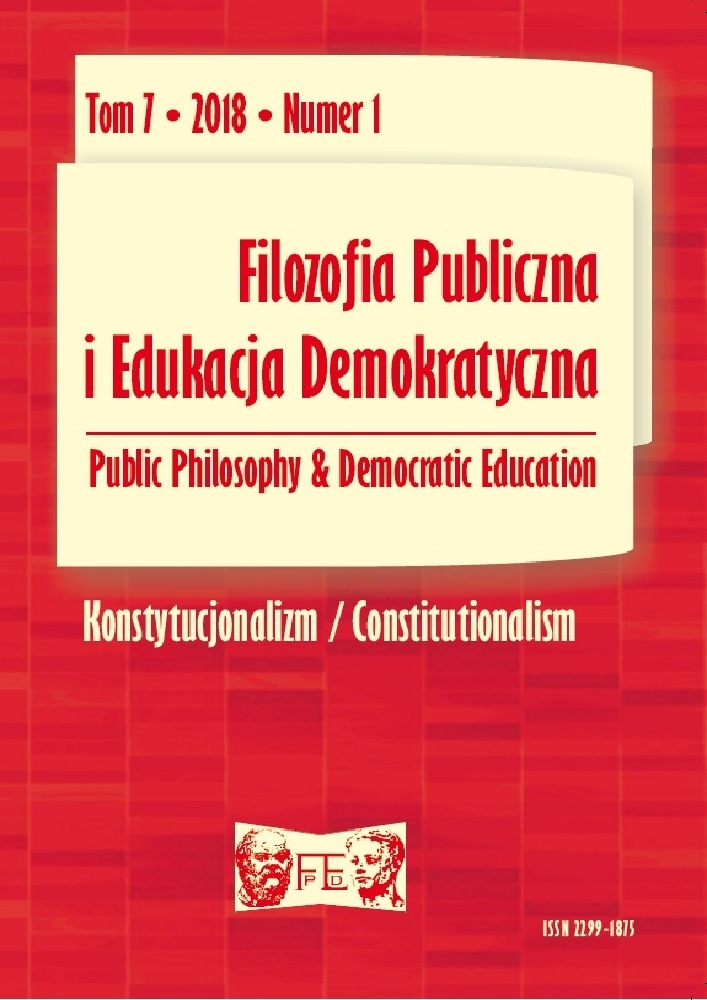Abstract
The article discusses the nature and role of constituent power in contemporary constitutional democracies. It presents the genesis of the concept of constituent power (phrased by Joseph Emmanuel Sieyès within the distinction between «pouvoir constituant» and «pouvoir constitué»), different approaches to this concept framed in the XXth century legal science by such thinkers as H. Kelsen and C. Schmitt, and finally the contemporary interpretations of this concept. The author indicates and analyses two major issues relevant to the nature and role of constituent power in the contemporary constitutional democracy. Firstly, he examines the thesis that the democratic constituent power’s activity remains normatively undetermined. The search for internal normativity that might characterise constituent power in democracy determines such practical constitutional issues as discretion of the legislator within the process of making or amending the constitution. Secondly, the author points out that analysis of the role of pouvoir constituant» in contemporary constitutionalism should not be limited to analysis of the „constitutional moment” only; the significance of constituent power should not be seen just in the framework of the one-off act of making the constitution. Constituent power should remain an active participant of constitutional discourse which induces a search for new principles ensuring balance between constituent and constituted power in constitutional democracies.
References
Arendt Hannah, O rewolucji, Czytelnik, Warszawa 2003.
Böckenförde Ernst-Wolfgang, Państwo prawa w jednoczącej się Europie, tłum. Paweł Kaczorowski, Instytut Studiów Politycznych Polskiej Akademii Nauk, Warszawa 2000.
Carrozza Paolo, „Constitutionalism’s Post-Modern Opening”, w: Loughlin Martin, Walker Neil (eds), The Paradox of Constitutionalism: Constituent Power and Constitutional Form, Oxford University Press, Oxford 2007.
Cern Karolina, „Jak rozumieć rolę konstytucji we współczesnym społeczeństwie demokratycznym?”, Studia Prawno-Ekonomiczne 2016, t. 101, s. 23–39.
Corrias Luigi, „Populism in a Constitutional Key: Constituent Power, Popular Sovereignty and Constitutional Identity”, European Constitutional Law Review 2016, vol. 12, s. 6–26.
Eisgruber Christopher, Constitutional Self-Government, Harvard University Press, Cambridge, MA 2001.
Elster Jon, Ulysses and the Sirens. Studies in Rationality and Irrationality, Cambridge University Press, Cambridge 1979.
Elster Jon, Ulysses Unbound: Studies in Rationality, Precommitment, and Constraints, Cambridge University Press, Cambridge 2000.
Habermas Jürgen, „Constitutional Democracy: A Paradoxical Union of Contradictory Principles?”, Political Theory 2001, vol. 29, no. 6, s. 766–781.
Habermas Jürgen, Faktyczność i obowiązywanie. Teoria dyskursu wobec zagadnień prawa i demokratycznego państwa prawnego, tłum. Adam Romaniuk, Robert Marszałek, Wydawnictwo Naukowe Scholar, Warszawa 2005. Hirschl Ran, Towards Juristocracy: The Origins and Consequences of the New Constitutionalism, Harvard University Press, Cambridge, MA 2004.
Kaleta Krzysztof J., „Between Reflexivity and Effectiveness: Dilemmas of the Democratic Legitimacy of Constitutional Justice”, w: The Rule of Law and the Challenges to Jurisprudence, „Central and Eastern European Forum for Legal, Political, and Social Theory Yearbook” vol. 3, Péter Cserne, Miklós
Konczol, Marta Soniewicka (eds), Frankfurt am Main 2014.
Kaleta Krzysztof J., „Wykładnia prawa jako forma władzy politycznej. Stanowiska wobec interpretacji konstytucji w doktrynie francuskiej”, w: Tomasz Stawecki, Jan Winczorek (red.), Wykładnia konstytucji. Inspiracje, teorie, argumenty, Wolters Kluwer Polska, Warszawa 2014, 57–79.
Kelsen Hans, „Foundations of Democracy”, Ethics 1955, vol. 66, s. 1–100.
Kelsen Hans, O istocie i wartości demokracji, tłum. Felicja Turynowa, Księgarnia Powszechna, Warszawa 1936.
Korycka-Zirk Milena, Filozoficznoprawny wymiar kontroli konstytucyjności, TNOiK, Toruń 2017.
Kramer Larry, The People Themselves: Popular Constitutionalism and Judicial Review, Oxford University Press, New York 2004.
Lindahl Hans, „Constituent Power and the Constitution”, w: David Dyzenhaus, Malcolm Thorburn (eds), Philosophical Foundations of Constitutional Law, Oxford University Press, Oxford 2016, s. 141–159.
Lindahl Hans, „Constituent Power and Reflexive Identity: Towards an Ontology of Collective Selfhood”, w: Loughlin Martin, Walker Neil (eds), The Paradox of Constitutionalism: Constituent Power and Constitutional Form, Oxford University Press, Oxford 2007, s. 9–24.
Loughlin Martin, „The Concept of Constituent Power”, European Journal of Political Theory 2014, vol. 13(2), s. 218–237.
Loughlin Martin, The Idea of Public Law, Oxford University Press, Oxford 2003.
Loughlin Martin, Walker Neil (eds), The Paradox of Constitutionalism: Constituent Power and Constitutional Form, Oxford University Press, Oxford 2007.
Loughlin Martin, Walker Neil, „Introduction”, w: Loughlin Martin, Walker Neil (eds), The Paradox of Constitutionalism: Constituent Power and Constitutional Form, Oxford University Press, Oxford 2007, s. 1–8.
Negri Antonio, Insurgencies. Constituent Power and the Modern State, University of Minnesota Press, Minneapolis–London 2009.
Rawls John, Liberalizm polityczny, tłum. Adam Romaniuk, Wydawnictwo Naukowe PWN, Warszawa 1998.
Rosanvallon Pierre, Kontrdemokracja. Polityka w dobie nieufności, tłum. Agata Czarnacka, Wydawnictwo Naukowe Dolnośląskiej Szkoły Wyższej, Wrocław 2011.
Rosanvallon Pierre, La légitimité démocratique. Impartialité, réflexivité, proximité, Éditions du Seuil, Paris 2008.
Schmitt Carl, Nauka o konstytucji, Fundacja Świętego Mikołaja, Redakcja „Teologii Politycznej” Warszawa 2013.
Sieyès Joseph-Emmanuel, Czym jest stan trzeci? Esej o przywilejach, Wydawnictwo Sejmowe, Warszawa 2016.
Sulikowski Adam, Konstytucjonalizm a nowoczesność. Dyskurs konstytucyjny wobec triumfu i kryzysu moderny, Wydawnictwo Uniwersytetu Wrocławskiego, Wrocław 2012.
Troper Michel, „Justice constitutionnelle et démocratie”, Revue Française de Droit Constitutionnel 1990, n° 1, s. 31–48.
Tushnet Mark, Taking Constitution Away from the Court, Princeton University Press, Princeton 1999.
License
Copyright (c) Authors retain copyright and publishing rights to their articles in this journal, granting the journal the right to distribute them under the terms of the CC BY-NC-ND 4.0

